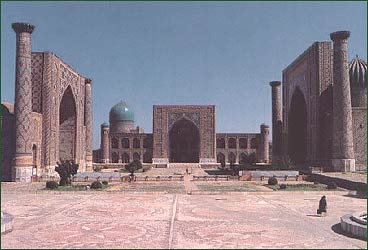|
|
 |
 |
 |
 |
Tourism |
 |
 |
 |
Samarkand - General Information and History
|
 |
<<
1
2
3
4
5
6
7
8
9
10
11
12
13
14
15
>>
|
 |
Samarkand is the second largest city of Uzbekistan and is of the same age as the city of Babylon or Rome. Samarkand is situated in the valley of the river Zerafshan (bearing gold). Modern Samarkand is amazingly peaceful and tranquil with population of about half a million. People always lived here since immemorial times, because of the best natural conditions of the fertile soil and the fresh mountain water and air.

Registan - the Center of Samarkand
The history of Samarkand is about 2,500 years old and has witnessed a lot of upheavals during the times of Great Alexander (Makedonsky), the Arabic Conquest, Genghis-Khan Conquest and lastly Tamerlane's. Hence, the culture of Samarkand was developed and mixed together with the Iranian, Indian, Mongolian and a bit of the Western and Eastern cultures.
Majestic and beautiful city Samarkand has a marvelous and attractive power. Poets and historians of the past called it "Rome of the East, The beauty of sublunary countries, The pearl of the Eastern Moslem World". Its advantageous geographical position in Zaravshan valley put Samarkand to the first place among cities of the Central Asia.
Samarkand is the site of Alexander the Great's slaying of his friend Cleitos, the pivot of the Silk Road and the city transformed by Timur in the 14th century into one of the world's greatest capitals. In XIV-XV centuries Samarkand became the capital of the huge territory of Temur's Empire, which collapsed after his death. The most part of monuments in Samarkand was built during his rule or by his descendants. Founded over 5000 years ago, the city flourished until the 16th century before the sea routes to China and the rest of the East diminished its importance as a trading center. Much of its past glory survives or has been restored.
Samarkand was the cultural center of the ancient state. A lot of famous scientists and poets of the East lived and worked in Samarkand, among them are Ulugbek, Alisher Navoi, Rudaki. Since the old days Samarkand was a worldwide forum. And all roads converged on Registan which was a trade, handicraft and public center of the capital.
|
 |
|
 |
|
 |
 |

